|
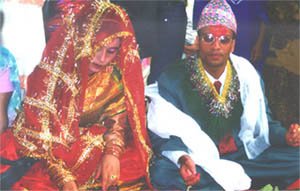
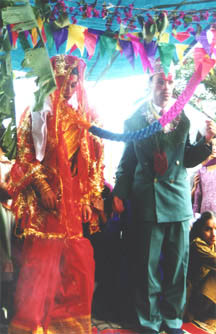
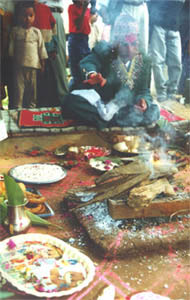
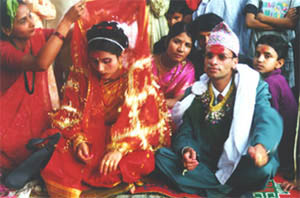
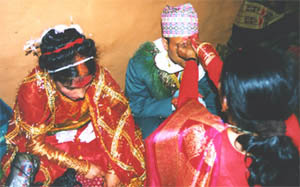
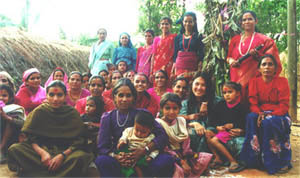
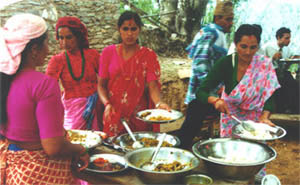
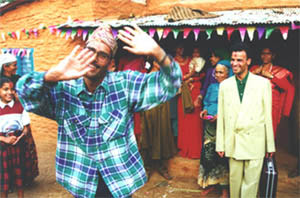
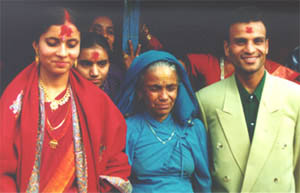
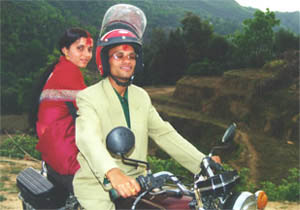
|
Shova
returns in her new sari, this one silk and gilded with rich gold and
green. Her tuile veil is replaces by a traditional wedding veil, criss-crossed
with shiny gold foil trim. A white khatta, prayer scarf, is placed over
both their shoulders, but it falls into his lap.
The rituals
continue...the new couple following the priest's lead. Tossing rice,
water, and other things into the fire, as instructed. At one point, they
stand up and with Tika behind her, his hands around her and clasping
hers, together they throw rice down onto the fire.
Then they walk three
times around the small canopy, stopping at each cardinal point.
At
times, she leaves and only Tika remains to carry out the rituals as he
prepares himself to take on this new responsibility.
At
times, near tears, she tries to retreat into her veil, but her sister
pulls it away and off her face.
Finally,
the moment everyone has been waiting for. A white sheet is folded into a
long ramp and one end held at her forehead. Tika is given sindoor,
special red-orange powder in his palm. Starting at the far end of the
sheet, the sindoor is ritually spread along the sheet up to her forehead
and then pressed into the part of her hair. This is repeated three
times, and the most important part of a wedding ceremony. They are now
married. Everything else is fluff. If, at any time, a man places sindoor
in the part of a women's hair, they are absolutely married in Nepalese
culture. Once married, all Nepalese women will wear sindoor in the part
of their hair for the rest of their lives, until their husband dies,
then they must stop. Widows may never wear red clothes or receive a red
tika. Instead they opt for white, blue and yellow with only white and
yellow tikkas.
Her
sister takes out a small hankerchief, folds into a square and pins it
into her hair over the sindoor, covering it completely. Her father or
male relatives are not allowed to see it on her forehead on that day,
representing as such, her entrance into womanhood.
Finally,
the rituals are over. A light rain as started. The men begin to take out
the chairs and table at which they sat, and load them into the waiting
truck. Other items are brought out from the house. A darage, a large
metal locker that Nepalis use for clothing storage as home do not have
closets, a fan, copper water vessels, a dining table and chairs, and a
cow, a God in their new home. These things represent her dowry. Tika,
for his part, tried to refuse the dowry, but they insisted on some
things. Weddings I have been to recently in Kathmandu were completely
over-the-top with dowries that soared above $10,000 US dollars. This is
Nepal's new monied class. You have to pay for membership.
Shova
is now crying. Her three younger sisters lead her into the van and stay
with her, trying to reassure her, wipe away her tears while the final
preparations are made to leave. Tika comes and we load into the van. She
is staring out the window at her home, as we pull away. The van, the
bus, and the truck now laden down.
The
journey is slow now because of the rain which has picked up. The road to
the village side is wet and muddy. We reach the base of the mountain and
begin a gruelingly slow journey back up to Tika's home. A deep quiet has
come over the group. There is not the same singing as before. Having
left late, it is now dark and the trail completely unlighted. Sarita, my
Nepali sister, is walking with Shova trying to hold an umbrella over her
head and lead her across the unfamiliar terrain. In her platform shoes,
she almost falls many times and that only increases her crying. Sarita
brought for me an extra umbrella, which I share with the video-man. He
is hogging it all for his camera, so I walk ahead and get drenched.
We
finally arrive back at Tika's home. The rain has driven the women into
the house and they are spilling out into the shelter of the front porch.
They are still singing and dancing. As the first of our group straggle
in, they bombard us with questions. But I just sit on the floor
exhausted from the climb. Soon, Shova and Tika arrive and she is
immediately hussled into the house to an area already prepared for their
arrival. They are seated on the floor and the women gather around
tightly, trying to see her face, to see her beauty.
The
married women, one by one, bless the new couple with tikka and envelopes
of money, but with a new twist. Each time, the new bride must get up and
genuflect, kneeling all the down and touching her forehead to the
women's feet to show great respect for the commnity of women, of which
she is the newest member.
Me, center right,
and the mother's committee of Chitopani, as they like to be known.
Once
all the women had blessed them, the ritual was finally over. They ate a
meal together while people milled all about, more casual now. Outside, the women were still
dancing and singing, as
they had been all day, and
this time, the men of
the entourage joined in.
The rain abated and people were in no mood to stop. Singing contests
began, with groups of men challenging women. A chorus would be sung by
all, then one side would sing a verse, in flirtation, followed by the
chorus. Then the member of the other side would have to retort, the
saucier the better. The madal, a Nepali drum, was played during the
chorus and members of both sides would spontaneously jump up and dance,
then pause and eagerly await the next raunchy verse.
Inside
the house, away from all the festivities, sat Shova. She looked sad and
forlorn, sitting off to one side. Tika was outside celebrating, and all
around her the women were chattering like birds, but not to her. I tried
to cheer her up, and spoke to her in my broken Nepali until I got a
laugh out of her. From that moment on, she clung to me like a life line.
Outside, a Gurung youth group had arrived to perform. Together we went
outside and watched them. Tika came over and seemed relieved at my
presence, because it gave her comfort in a difficult time. FInally, I
grew weary and asked Sarita where I should sleep. People seemed content
to bunk on open ground. I just wanted to know where my piece of earth
was. We went to Tika's childhood room and talked awhile, the three of
us. Then, Shova looked at me and said "Tapaii masanga sutnus."
Will you please sleep with me? HUH? I struggled to make
sure I understood her
properly. When she repeated the request, I searched frantically for the
correct nepali words to reply. Finally, I blurted out "Tapaii
shriman, dherai ris lagyo" Your husband will be very angry! I looked
to Sarita for help. 'Ke Garne?' What to do? She said,
go ahead. Shova was too scared to sleep with her husband, so, on this
wedding night, I slept with the
bride instead. That has got to
be a faux pas in any culture
but who am
I to say...
The next day dawned
and the festivities continued. The local men cooked a huge meal and the
women served it.
After
eating, Tika and Shova prepared to leave to go to his home in Lakeside.
Everyone turned out to say goodbye, and some were so happy...
they
burst in dance. Look Devi Uncle go.
I
finally got Shova to smile for a photo. Here she is with her new husband
Tika and Tika's mother.
And
the bride and groom rode off into the sunset...
side
saddle of course...
P.S.
I am glad to note that their relationship was consumated pretty quick
because exactly nine months later she gave birth to little Sanu, a sweet
baby girl.
Culture | 1
| 2
| 3 |
